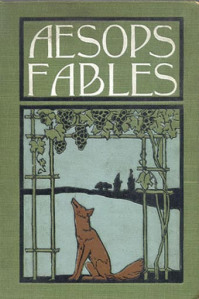
Since it’s Monday, I thought I would share with you some musings about the educational fables Common Core Standards have created for us. (I’ll continue to refer to the CCS throughout the rest of the post by giving it a book title of ‘Common Fables of Education’).
Unlike Aesop’s book, ‘Common Fables of Education’ ( in Aesop’s time fables had to be short, involve animals, and have valuable life lessons combined in them). I doubt thousands of years from now we will still be treasuring ‘Common Fables of Education’ like we have Aesop’s. Why? Well, Common Core is definitely not short, has no valuable life lessons worth holding on to (save the ‘don’t ever try this again’ lesson), and only involves animals in restrictive ways. The only way ‘fable’ can be inserted in the Common Core ‘book’ is that one of the other definitions for ‘fable’ is ‘a falsehood‘. We ALL know how false the ‘Common Core Standards’ are! For the rest of the post, I’m not going to go over every single falsehood we’ve been given, but I will hit some of the most grievous ones!
“College & Career Ready”; ‘lifelong learners’; ’21st century workforce’:
One of Aesop’s Fables told of a lioness who only had one cub, however it turned out that one cub was the king of the jungle. The moral, which ‘Common Fables of Education’ missed by a mile: there’s more value in who we are than how many we are. Another of his fables tells of an old man being made fun of by 3 younger ones. Turns out the entire lot of the young ones died before the old man. The moral ‘Common Fables of Education’ misses here: life is uncertain and you never know what you will end up having to do.
“High Stakes Standardized Testing”; ‘student longitudinal data tracking’:
For these I offer Aesop’s tale of the shepherd who found an abandoned wolf, took it in, raised it up. The shepherd taught the wolf to steal its food. When the wolf grew up, he stole the shepherd’s food. The moral ‘Common Fables of Education’ could use is what we teach, or in this case assess, very well may come back and be used against us.
“State led, state created”; ‘just standards, not curriculum’:
For these modern day fables, I apply the Aesop story of the widow with helpers. The widow would wake the helpers up each morning for chores. Hating such work, the helpers hatch a plot, carry it out, and end up worse off than before. The moral ‘Common Fables of Education’ missed: committing what’s illegal only leads to more trouble.
“Rigorous”, ‘richer, deeper’; ‘makes me a better___________’:
Aesop hit the nail on the head with the moral of when seeking change, make sure it’s for the better. In his story about the frogs saddened over having no ruler, the frogs were granted one. In the end, no frogs were left because the ruler wasn’t pleased with the frogs. What ‘Common Fables of Education’ seeks to tell us is that we will be better. However, I challenge you to listen to the parent interviews on the second part of “Building the Machine” released in the past couple of weeks. If you’ve not seen it you need to hear their voices as they share the abject pain of their children who are not better at all. (link: http://www.youtube.com/watch?v=XRrG6-g2jMk)

In closing:
I leave you with a couple of fables that are best suited for those connected in any way to creating ‘Common Fables of Education’. The first is called the “Eagle and the Fox”. You’ll need to read the story for yourselves, but I’ll give you the moral that could be a warning to those responsible, those who are tyrants are not ever safe from those they mistreat.
(http://www.litscape.com/author/Aesop/The_Eagle_and_the_Fox.html)
The second one is “The Birds, the Beasts and the Bat”. Again, read the story for yourself. Moral to be directed to those connected to creating and supporting the ‘Standards’: those who seek to deceive can expect to be shunned.
(http://www.litscape.com/author/Aesop/The_Birds_the_Beasts_and_the_Bat.html)
As I close out my musings for the day, know that like the classic tales of Aesop, life is to be treasured. Life is as unpredictable now as it was back then. What’s stood the test of time, however, are the morals within each of the tales. Just like other time tested books we’ve loved and lived by. When you have morals that are deeply rooted, education will follow with ease. When you replace those morals with shallow agendas, education will become forced. It’s time we chuck the ‘Common Fables of Education’ and let our students get back to living life to its fullest.



Here’s proof I tried to sign up to receive updates. Never got the confirmation email. Please advise. Thanks! http://www.commoncorediva.com/about/?blogsub=confirming#blog_subscription-2
So sorry, I’m not sure what happened. I will do my best to get on it ASAP.